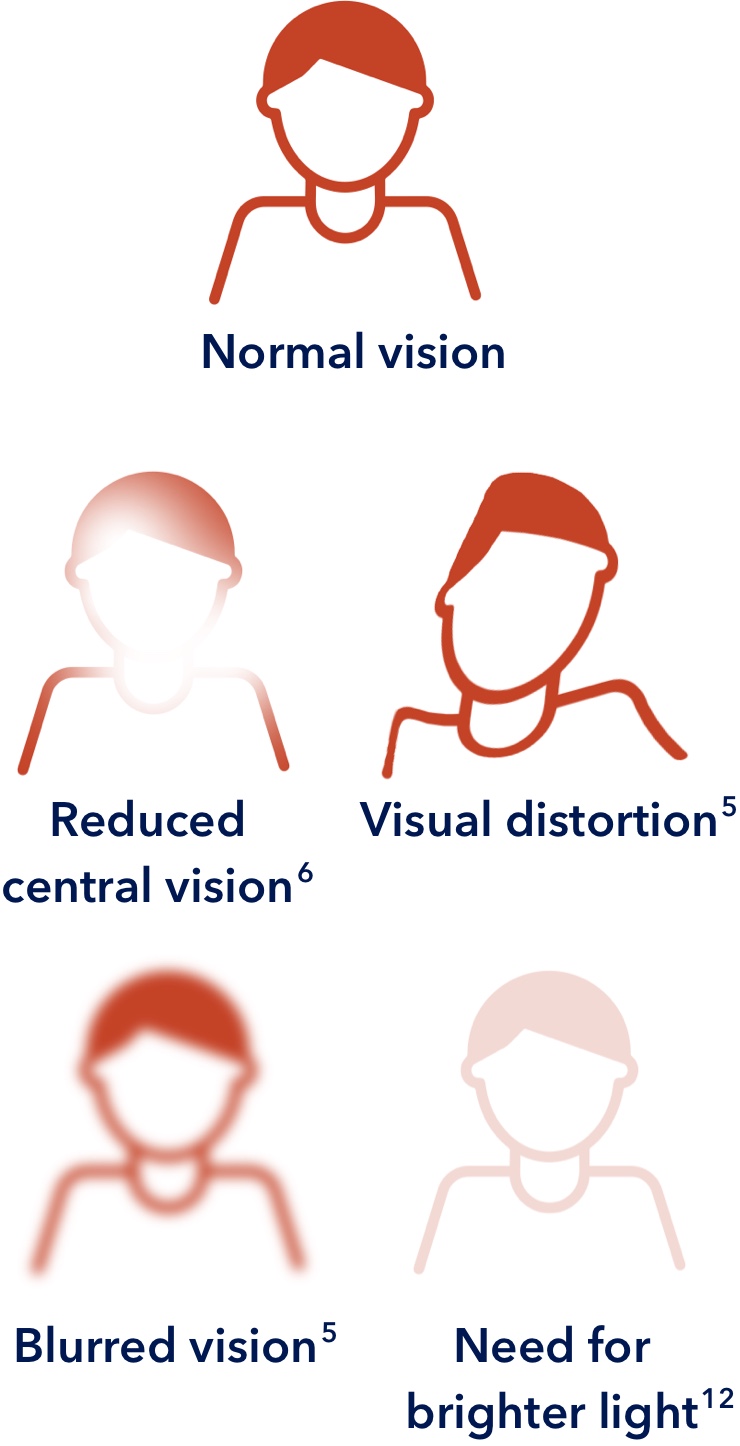Understanding
wet AMD
Neovascular Age-Related Macular Degeneration
What Is Wet AMD?
Neovascular age-related macular degeneration (wet AMD) is an advanced form of AMD.1 The risk of developing wet AMD is highest for people age 75 and older; in fact, this condition is the most common cause of severe vision loss for older adults in the US.2,3
About 200,000 new cases of wet
AMD are diagnosed every year.4
Wet AMD occurs when abnormal blood vessels grow into the retina.5 These rapidly growing vessels are very fragile and leak blood and other fluids under the retina.5 This can lead to scarring inside the eye and loss of central vision which, if left untreated, can be permanent.6
The Burden Of Wet AMD
While wet AMD only accounts for approximately 10 percent of AMD cases, it is very serious — 90% of blindness caused by AMD is due to wet AMD.7
Many people with wet AMD struggle to access the treatment they need.8 This is due to a variety of factors, such as the time required from both patients and caregivers to maintain monthly dosing and/or monitoring visits, or insurance issues.9-11 In daily life, keeping up with treatment (which includes seeing a retina specialist) can be overwhelming for patients and their loved ones who help with driving to/from appointments.9
If Left Untreated, Wet AMD Leads To
The Loss Of Vision In Most Patients,
Which Cannot Be Reversed.5
Investigational treatment options are now being studied in clinical trials, and you may be able to help advance this effort! Learn how you can help further research efforts by participating in the SOL study.
Experiencing Wet AMD


Treating Wet AMD
Many doctors currently treat patients who have wet AMD with regular injections of a drug called aflibercept (an anti-VEGF medication, or a medication that suppresses the protein VEGF that causes blood vessels to grow and leak).13 The SOL study involves intravitreal injections of OTX-TKI or aflibercept to see if OTX-TKI is a safe and effective way to prevent the progression of wet AMD.14
Learn more about the investigational drug
being studied in the SOL study.
The information provided here is not inclusive of all treatment options, nor should it replace medical advice from a physician about treating neovascular age-related macular degeneration (wet AMD).
REFERENCES: 1. National Eye Institute. Treatments for wet AMD (advanced neovascular AMD). Updated June 22, 2021. Accessed July 23, 2024. https://www.nei.nih.gov/learn-about-eye-health/eye-conditions-and-diseases/age-related-macular-degeneration/treatments-wet-amd-advanced-neovascular-amd. 2. Bright Focus Foundation. Age-related macular degeneration: facts & figures. Updated March 7, 2023. Accessed July 23, 2024. https://www.brightfocus.org/macular/article/age-related-macular-facts-figures. 3. Johns Hopkins Medicine. Age-related macular degeneration (AMD). Accessed July 23, 2024. https://www.hopkinsmedicine.org/health/conditions-and-diseases/agerelated-macular-degeneration-amd. 4. Maguire MG. LDI Issue Brief. 2012;17(8):1-4. 5. Hobbs SD, Pierce K. Wet Age-Related Macular Degeneration (AMD). StatPearls. Treasure Island (FL): StatPearls Publishing; 2024. 6. Gehrs KM, et al. Ann Med. 2006;38(7):450-471. 7. Harvard Medical School. AMD treatment guidelines. Accessed July 23, 2024. https://eye.hms.harvard.edu/eyeinsights/2015-january/age-related-macular-degeneration-amd. 8. Review of Ophthalmology. IRIS Registry: wet AMD patients are undertreated. Updated December 10, 2023. Accessed July 23, 2024. https://www.reviewofophthalmology.com/article/iris-registry-wet-amd-patients-are-undertreated. 9. Monés J, et al. Ophthalmologica. 2020;243(1):1-8. 10. Khurana RN, et al. Ophthalmology. 2023;130(7):672-683. 11. Okada M, et al. Ophthalmology. 2021;128(2):234-247. 12. Taylor DJ, et al. BMJ Open. 2016;6(12):e011504. 13. American Academy of Ophthalmology. Anti-VEGF treatments. Updated July 26, 2023. Accessed July 23, 2024. https://www.aao.org/eye-health/drugs/anti-vegf-treatments. 14. Study to evaluate the efficacy and safety of intravitreal OTX-TKI (Ocular Therapeutix) (axitinib implant) in subjects with neovascular age-related macular degeneration. NCT06223958. Updated July 5, 2024. Accessed July 23, 2024. https://clinicaltrials.gov/study/NCT06223958.
